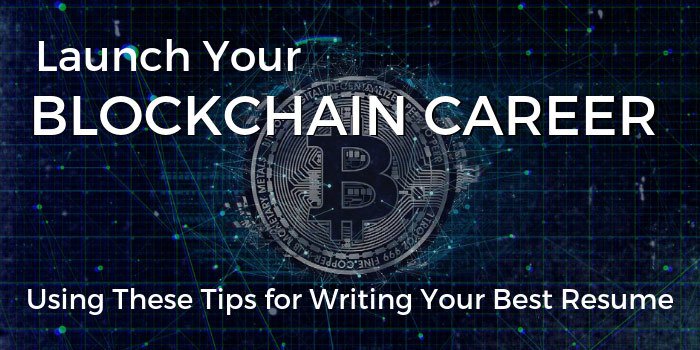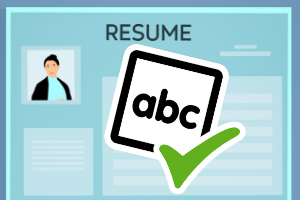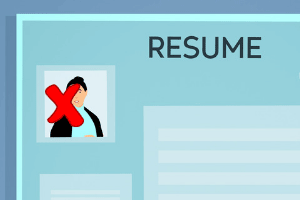When putting together your resume, you’re essentially trying to put together the best representation of yourself, including your skills and experience. You want to give off the most outstanding first impression possible, to put yourself in the top rankings for a potential job.
This is especially true in the crypto industry, where increasing popularity means greater numbers of people are looking to get into the field. Competition will naturally increase, so you’ve got to make sure you’re giving yourself the best possible chance at giving you a head start over the competition. Here are some tips you can utilize in creating your resume to launch or further your blockchain career.

Always Be Professional
Regardless of whether you’re working in an office or at home, you’ve got to keep things professional if you expect to have any shot of landing a job in your field. You want employers to take you seriously, and presenting yourself as a professional from the start is the best way to set that precedent.
There is a high expectation of standards and level of trust that comes along with an blockchain career, so when you give off that sense of professionalism, your potential employers will have reason to believe that you will carry those same standards to your work.
Clearly State Your Mission
Everyone has got different goals, including those within the same industry and even those that hold the same job title. Your mission statement generally leads off your resume and lets potential employers know exactly who you are and what matters most to you in gaining this position. Be truthful, while also highlighting what you’ve got to offer in your new career.
Tailor your mission statement to reflect the organization you’re hoping to work for. Each resume you put out there will need to be slightly altered in order to properly reflect that specific organization.
“When you do something as simple as customizing your mission statement to a company this, which may seem small and insignificant, you’re demonstrating that you’ve put a great deal of time and thought towards learning about that organization and writing your mission statement directly for them,” says Mrs. Daisy Assman, a freelance resume proofreader.
Master the Basics

Ensure you have a strong understanding of blockchain fundamentals, distributed ledger technology, and relevant programming languages such as Solidity, and frameworks like Ethereum.
Stay updated with recent developments and trends in the blockchain space through online courses, certifications, and community engagements.
Acquire Certifications
Obtain recognized certifications like Certified Blockchain Expert (CBE), Certified Blockchain Developer (CBD), or others that are relevant to the position you are applying for.
Listing these certifications on your resume can significantly boost your credibility and demonstrate your dedication and expertise in the field.
Hands-on Experience
Engage in personal or open-source projects to garner practical experience. Create a portfolio of your projects, include the link on your resume, and be prepared to discuss them during interviews.
If possible, intern or volunteer at blockchain startups or projects to gain real-world experience.
Networking
Join Blockchain Communities:

Blockchain communities are excellent platforms for learning, sharing knowledge, and connecting with industry experts and enthusiasts.
Participate in discussions, ask questions, and share your own insights to establish your presence and create meaningful connections.
Attend Industry Meetups:
Industry meetups, whether they are local or global events, are invaluable for meeting professionals in the blockchain space.
Attending these events provides an opportunity to learn about the latest trends, technologies, and opportunities in blockchain. It also allows you to meet potential employers, mentors, or collaborators in person.
Engage in Online Forums:
Platforms like Reddit, Stack Overflow, or specialized blockchain forums are good places to connect with others, solve problems together, and showcase your knowledge and skills.
Engaging in these forums also keeps you updated on the challenges and advancements in the blockchain sector.
LinkedIn and Other Professional Networks:
Create and maintain a professional profile on platforms like LinkedIn, and join blockchain-related groups to engage in discussions and connect with industry professionals.
Regularly sharing and commenting on relevant content, as well as publishing your own insights or articles, can help establish your expertise and interest in the blockchain space.
Referrals:
Having a referral from a respected professional within the blockchain community can significantly enhance your job application.
Referrals are often perceived as a testament to a candidate's abilities and fit for a role, making you more likely to be considered.
Collaborative Projects:
Participating in open-source projects or collaborative endeavors allows you to work with others, learn from experienced developers, and contribute to real-world projects.
Your contributions to notable projects can serve as practical demonstrations of your skills and commitment to the blockchain community.
Educational Events and Workshops:

Engaging in blockchain workshops, webinars, and educational events can expand your knowledge and provide networking opportunities.
You can also consider presenting at these events once you have gained a substantial amount of expertise, to further establish your standing in the community.
Follow-Up:
After connecting with individuals, whether online or in person, always follow up to express your gratitude for their time and to keep the connection alive.
Building genuine relationships rather than merely collecting contacts will serve you well in the long run.
Mentorship:
Seek mentorship from experienced individuals in the blockchain sector. A mentor can provide invaluable guidance, feedback, and connections to help you advance your career.
Job Boards and Company Events:
Keep an eye on job boards, company-hosted events, or recruiting meetups. Engage with companies you’re interested in, and express your enthusiasm for blockchain technology.
Through effective networking, you can greatly enhance your understanding of the blockchain sector, establish meaningful professional relationships, and significantly improve your job prospects within this exciting and rapidly evolving field.
Tailored Resume

One way to quickly diminish your credibility and professional appearance is to allow your resume to be sent out with spelling and grammar errors throughout. If you’ve got a great deal of experience, you may think that a little error here and there isn’t a big deal.
But, it actually shows that you either don’t have these skills or you don’t care to take the time to check for errors. If you want a hand with checking over your resume, or just want another set of eyes to look things over before sending this off to potential employers, there are some great tools that can help.
- Customize your resume for each position by emphasizing the skills, experiences, and projects most relevant to the job description.
- Use keywords found in the job listing to help your resume get past Applicant Tracking Systems (ATS).
Showcase Achievements and Skills
Highlight your achievements in past roles, especially those related to blockchain or tech projects, using quantifiable metrics to show the impact you made. Showcasing your achievements and skills effectively in your resume is vital for attracting the attention of hiring managers, particularly in the competitive blockchain and tech sector.
List skills such as problem-solving, analytical thinking, and programming languages you are proficient in. Here’s how to go about it:
Quantify Achievements:
Whenever possible, use quantifiable metrics to highlight the impact you’ve had in previous roles.
For example, "Optimized smart contract gas costs resulting in a 30% reduction in transaction fees" or "Led a team of 5 developers in deploying a decentralized application that secured 10,000 active users within the first month."
Use Action Verbs:
Begin each achievement or responsibility with strong action verbs such as “developed,” “implemented,” “optimized,” “led,” etc., to portray your proactive approach and the impact you made.
Relevant Technologies and Frameworks:
Mention the blockchain platforms, programming languages, and tools you utilized to achieve these accomplishments.
For example, specify if you worked with Ethereum, Hyperledger, Solidity, Truffle, etc.
Highlight Problem-Solving Abilities:
Showcases instances where you solved complex problems, especially those pertinent to blockchain or tech projects.
Describe the challenges faced and how you addressed them, highlighting the positive outcomes that ensued.
Demonstrate Analytical Thinking:

Detail your approach to analyzing issues, evaluating solutions, and making data-driven decisions.
Mention any tools or methodologies you employed for analysis.
Technical Skills:
List the programming languages you are proficient in such as Solidity, JavaScript, Python, etc.
Mention other relevant technical skills like smart contract development, consensus algorithms, cryptography, or experience with blockchain frameworks and libraries.
Soft Skills:
Besides technical skills, mention soft skills such as teamwork, leadership, communication, and time management which are crucial for collaborative projects and overall success in the workplace.
Continued Learning and Certifications:
Highlight any certifications, courses or self-directed learning endeavors that contributed to your achievements.
Project Outcomes:
Mention the outcomes and success metrics of your projects. This could include user adoption rates, security improvements, process efficiencies, or financial metrics.
Customization:
Tailor your achievements and skills section to the job you are applying for. Focus on the skills and accomplishments most relevant to the position.
Professional Development:
If you’ve attended workshops, contributed to open-source projects, or participated in blockchain communities, this could be added as achievements to showcase your active engagement in the field.
Use of Portfolio:
Consider creating an online portfolio to provide a more in-depth look at your projects and achievements. Provide a link to this portfolio on your resume.
Include Online Presence
Share links to your GitHub repository, LinkedIn profile, or a professional blog where potential employers can see your work and read your thoughts on blockchain technology.
If you have contributed to reputable blockchain publications or have been a speaker at industry events, be sure to include these as well.
Continuous Learning

The blockchain field is exceptionally dynamic with new developments, technologies, and frameworks emerging frequently. Continuous learning is vital to stay relevant and competitive in this domain. Here are some points elaborating on the importance of continuous learning and how to portray it on your resume or during discussions with potential employers:
Showcase Current Learning Endeavors:
If you're enrolled in any ongoing courses, certifications, or educational programs related to blockchain, be sure to mention them on your resume.
It's advisable to include a section titled “Professional Development” or “Certifications” on your resume to list these endeavors.
Future Learning Plans:
Mentioning future certifications you plan to undertake shows your commitment to staying updated and improving in your field.
During interviews, you can discuss your short-term and long-term learning goals, emphasizing your enthusiasm for continuous self-improvement.
Industry Certifications:
Industry-recognized certifications like Certified Blockchain Expert (CBE) or Certified Blockchain Developer (CBD) are valuable for validating your skills and knowledge.
Plan and strive to obtain such certifications, and mention any upcoming exam dates if applicable.
Engagement with Online Communities:
Engaging with online forums, blockchain communities, or following influential figures in the blockchain space are informal yet effective ways to continue learning.
Mention your active participation in these communities and the insights you've gained from them.
Personal Projects:
Working on personal or open-source projects can also be a form of continuous learning.
Describe any personal projects you are working on, explaining how they contribute to your learning objectives.
Reading Industry Literature:
Stay updated with the latest industry research, whitepapers, and publications.
You can mention your habit of reading and staying updated on industry literature during discussions with potential employers.
Attending Workshops and Conferences:
Attending blockchain-related workshops, webinars, and conferences can significantly contribute to your knowledge base.
Mention any notable events you have attended or plan to attend, along with key takeaways and how you've applied or plan to apply what you've learned.
Online Courses and Tutorials:
Online platforms offer numerous courses on blockchain technology and related programming languages.
Mention any platforms you frequently use for learning and any courses you have completed or are in the process of completing.
Mentorship:
Having a mentor in the blockchain space can facilitate continuous learning through guided advice and feedback.
Mention any mentorship relationships and how they contribute to your professional development.
Subscriptions to Professional Bodies:
Subscribing to professional bodies related to blockchain can keep you updated on the latest developments and best practices in the field.
Mention such memberships and any active roles you play within these organizations.
Employers in the blockchain sector value candidates who are passionate about learning and evolving alongside the industry. Your ability to articulate your commitment to continuous learning can significantly enhance your attractiveness as a potential hire.
Professional Summary
A professional summary is a brief section at the top of your resume that encapsulates your qualifications, skills, experiences, and career goals. It's your chance to make a strong first impression and encourage hiring managers to continue reading your resume. Here’s how to craft an impactful professional summary for a blockchain-oriented career:

Concise and Clear:
Keep your summary concise and to the point, generally around 3 to 5 sentences. Be clear in your wording and avoid any jargon that might be confusing to readers.
Tailored to Position:
Tailor your summary to the position you are applying for. Mention the specific blockchain technologies or frameworks you have experience with that are relevant to the job description.
Professional Title:
Start with your professional title or the role you are targeting. For instance, "Experienced Blockchain Developer" or "Certified Blockchain Professional".
Key Skills and Technologies:
Highlight your key skills, and technologies you are proficient with, such as Solidity, Ethereum, Hyperledger, smart contract development, or any other relevant blockchain technologies.
Experience and Achievements:
Briefly mention your relevant experience and any notable achievements. Include quantifiable results if possible, to provide concrete evidence of your expertise and impact.
Career Goals:
State your career goals in a way that aligns with the position you're applying for and the future path of the company. This shows that you have a clear vision and ambition in the blockchain field.
Certifications or Education:
If you hold any notable certifications or have a strong educational background in blockchain or related fields, consider mentioning them briefly.
Seek Professional Advice
As the blockchain sector is highly specialized and continuously evolving, seeking advice from professionals who are well-versed in this arena can be immensely beneficial. Here are several ways in which consulting with a career coach or a resume expert specializing in tech and blockchain careers can provide value:
Industry Insights:
- Professionals such as career coaches or resume experts often have extensive knowledge and insights about the blockchain industry. They can provide up-to-date advice on what employers are looking for, and how the industry is evolving.
Personalized Guidance:
- They can provide personalized guidance based on your specific career goals, skills, and experiences. This personalized advice can be invaluable in helping you to stand out in a competitive job market.
Resume Optimization:
- A resume expert can help you optimize your resume by highlighting your most relevant skills, experiences, and achievements in a way that appeals to potential employers in the blockchain sector.
- They can also help tailor your resume to pass through Applicant Tracking Systems (ATS) by ensuring the right keywords and phrases are present.
Interview Preparation:
- Career coaches can help prepare you for interviews by conducting mock interviews, providing feedback on your responses, and advising you on how to effectively communicate your skills and experiences.
Networking Strategies:
- They can provide strategies on how to network effectively within the blockchain community, which can be crucial for discovering job opportunities.
- They might also have connections within the industry which could be beneficial for job referrals.
Career Path Planning:
- They can help you plan your career path by identifying potential roles, companies, and additional skills or certifications that might be beneficial for your long-term career goals.
Negotiation Tactics:
- Advice on negotiating job offers to ensure you receive competitive compensation and benefits.
Accountability and Motivation:
- Regular check-ins with a career coach can provide accountability and motivation during your job search.
Branding:
- Guidance on how to brand yourself effectively online through professional platforms like LinkedIn or a personal blog to attract potential employers.
Continual Learning Recommendations:
- They may suggest certain courses, certifications, or reading materials that can bolster your blockchain knowledge and skills, and keep you updated on current industry trends.
Be Creative
If you’re looking to launch your blockchain career by landing your first job in the field, you may not have any direct experience to list. But, if you think creatively, chances are you’ll be able to come up with other experiences you can list that will be relevant.
When your experience simply needs a little boost, you may want to consider offering free training sessions to bring in others that you can teach. Remember, you always want to keep your experience history honest, so if you need to bump it up slightly, you may need to think of creative ways where you can still be honest about the work you’ve done.
It may actually take some time and several attempts before you’re able to land that first blockchain job. But, with each attempt, you will learn more about the qualifications and experiences you will be required to have and how you can potentially boost your experiences in ways that increase your chances of future employment.
Selfies Need Not Be Included

Yes, they’re popular in social media, but they are far from needed when it comes to resumes. Employers want to know what your skills are, not what you look like.
And, including a selfie with your resume does nothing to add value and only serves to make you look unprofessional. Focus on highlighting your skills and experience and leave the self-portraits out.
Available References
You won’t necessarily need to list your references within your resume, but you’ll want to make it known that those references are available should a potential employer be looking to contact one of them. Whether it’s a previous employer, teacher or other source, have a listing of relevant references you can provide if needed.
It’s also a good idea to let your references know ahead of time that you’re providing their contact information as a reference, so they’re not surprised when they receive a phone call and so they can somewhat prepare what they’ll say.
Get your foot in the door with your new blockchain career by putting forth your best resume possible. Using these tips, you can help ensure you’re providing potential employers with the best representation of yourself, giving you the best possible chance of landing the career of your dreams.

Chloe Bennet works as an IoT specialist at Grade On Fire. She loves writing articles about technology development and IoT. Also, Chloe is a tutor at Rated Writing academic website.
Author // Chloe Bennet
